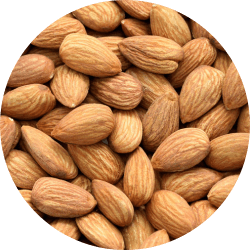No doubt you’ve come across many articles and studies touting the various benefits of eating raw almonds over roasted almonds, but what about almond butter? Do the benefits carry over, or is something lost during processing? More importantly, are raw almonds really better than roasted, or have we been mislead? In this post we’ll be addressing these questions to determine if raw almond butter is better than roasted almond butter.
| In short, raw almond butter is better than roasted almond butter so long as the almonds were pasteurized with steam and not chemically pasteurized with Propylene Oxide. |
Almond Butter
Almond butter is a nutty spread made by processing almonds that are ground into a buttery paste-like consistency.

Much like peanut butter, almond butter comes in several varieties, including smooth and crunchy. There’s also the “natural” variety, which requires stirring in order to combine the oil with the ground almond paste to get that buttery consistency. Then there’s the emulsified variety, which doesn’t require any stirring. The natural variety should be refrigerated after opening in order to prevent oil separation.
How Almond Butter Is Used
Almond butter can be used the same way peanut butter is used, including…
- As a spread for sandwiches
- For dipping fruits and veggies
- As a baking ingredient
Almond butter is just one of many varieties of nut and seed butters that can be incorporated into a plant-based diet. Be sure to check out the ultimate vegan grocery list for more nut butter options.
Benefits Of Using Almond Butter
The primary benefit of consuming almond butter as opposed to peanut butter is that it typically has more fiber than peanut butter does. It’s also a good alternative for anyone who may have peanut allergies, or simply doesn’t like the taste of peanut butter. Almond butter, by comparison, has a milder flavor and aroma.
Raw Almond Butter VS Roasted Almond Butter

Almonds are different from other types of nuts and seeds. By law, almonds must be pasteurized before consumption. Pasteurization is the process of exposing a food to heat in order to kill any harmful pathogens.
Because of this, almonds can vary in how they’re prepared for consumption. The two main varieties of almonds are raw and roasted — both of which can be used to make almond butter.
In order to determine if raw almond butter is better than roasted almond butter, it makes sense to examine each variety and weigh out the pros and cons.
Roasted Almonds
There’s two different types of roasted almonds — dry roasted and oil roasted.

Dry roasted almonds are created when almonds are exposed to dry heat, typically at temperatures in the range of 300 to 350 degrees Fahrenheit. Dry roasted almonds have a crunchier texture.
Oil roasted almonds are created by cooking the almonds in oil, either in a frying pan or in the oven. Oil roasted almonds tend to be more flavorful, but slightly higher in fat.
Almonds are roasted for a variety of reasons. Roasting almonds brings out their flavor, enhances their aroma, and gives them a crunchier consistency. Roasted almonds tend not to be as chewy and earthy as raw almonds are.
Benefits Of Roasted Almonds
Nutritionally-speaking, there’s very little difference between roasted and raw almonds. Almonds that are dry roasted tend to be slightly lower in calories by weight, but the reason for that is believed to be because of the moisture lost during the roasting process.
Almonds roasted in oil tend to be slightly higher in fat and calories, mainly due to the oil they’re roasted in.
The benefits of consuming roasted almonds over raw almonds boils down to personal preference in taste, texture, and aroma. This consideration can carry over when determining if raw almond butter is better than roasted almond butter.
Potential Downsides
Although roasting almonds does little to alter their nutritional profile, that doesn’t mean they’re without potential downsides. There are some considerations to make when choosing between raw and roasted almonds.
For one, roasted almonds have been found to contain Acrylamide — a chemical compound that has shown to increase cancer risks in rodents when they were exposed to it. Although large numbers of studies have failed to demonstrate a link between dietary Acrylamide consumption and cancer risk in humans, you can decide for yourself if you want to avoid consuming such a compound.
Another potential downside of roasted almonds is that the roasting process might damage the healthy fats they contain. When polyunsaturated fats are exposed to heat, they’re more likely to break down and create free radicals. According to Huntington’s Outreach Project for Education, at Stanford:
Free radicals are atoms or molecules that are highly reactive with other cellular structures because they contain unpaired electrons.
Finally, it is believed that oxidation can occur when roasted almonds are stored. This is also due to the breakdown of the polyunsaturated fats during the roasting process.
Raw Almonds
Now let’s have a closer look at raw almonds to weight the pros and cons of each.

Contrary to what you may believe, raw almonds aren’t actually raw. By law, almonds must be pasteurized before consumption. This is done to prevent harmful pathogens in the soil they were grown in from making their way into the food — namely salmonella, which there have been outbreaks of in the past.
There’s two different ways in which raw almonds are pasteurized — by chemical pasteurization and steam pasteurization.
Chemical Pasteurization
Chemically pasteurizing almonds entails exposing them to a chemical known as Propylene Oxide. Once harvested, the almonds are gassed with the chemical, which kills any harmful food-borne illnesses they may be harboring.
Steam Pasteurization
In steam pasteurization, the almonds are placed in large metal containers where they are exposed to steam at temperatures that rise to 165 degrees Fahrenheit. This is believed to kill any unwanted pathogens.
Benefits Of Raw Almonds
The primary benefit of consuming raw almonds is that they retain certain heat-sensitive nutrients that may have been killed off during the roasting process, like vitamin B1 (Thiamine). There’s also less risk of oxidation of the polyunsaturated fats associated with the roasted almonds, making raw almonds better for storing.
Potential Downsides
The potential downsides of consuming raw almonds depends on the method in which they were pasteurized.
Almonds that are pasteurized with steam may be a safer choice than almonds that were pasteurized with Propylene Oxide. This is because Propylene Oxide may be irritating to the skin, eyes, and respiratory tract. Because of this, it may be a good idea to check the labels of raw almonds and raw almond products (like almond butter) to make sure the almonds were pasteurized with steam rather than Propylene Oxide.
It should be noted that just because an almond product is labeled as organic and/or raw, that doesn’t mean it didn’t undergo chemical pasteurization. It’s understandable that this sort of labeling can be confusing.
Finally, it should also be noted that the Almond Board of California has laid out guidelines for pasteurization with Propylene Oxide.
Raw Almond Butter Is Better Than Roasted?
Taking everything we’ve gone over so far into consideration, a reasonable conclusion would be that raw almond butter is better than roasted almond butter so long as the raw almonds were pasteurized with steam and not gas. In this instance, you’ll get to retain the heat-sensitive nutrients that are lost in the roasting process, and you’ll avoid the fat oxidation that results from the roasting process. However, you’ll also avoid the potential negative consequences of consuming raw almonds that were pasteurized chemically.
The Final Verdict
Raw almond butter made with almonds that were steam pasteurized is the best type of almond butter. Roasted almond butter would be the second best, and raw almond butter that was made with chemically-pasteurized almonds comes in last.
Hopefully you found this article helpful. Thanks for reading!

